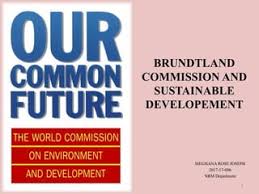The Brundtland Commission: Pioneering Sustainable Development
The Brundtland Commission, formally known as the World Commission on Environment and Development, was established by the United Nations in 1983. Named after its chair, Gro Harlem Brundtland, the commission aimed to address growing concerns about the accelerating degradation of the environment and its impact on human well-being.
One of the key contributions of the Brundtland Commission was the popularization of the concept of sustainable development. In its landmark report titled “Our Common Future,” released in 1987, the commission defined sustainable development as “development that meets the needs of the present without compromising the ability of future generations to meet their own needs.”
This definition highlighted the interconnectedness of environmental protection, economic growth, and social equity. The report emphasized that sustainable development requires a balance between economic progress, social inclusion, and environmental stewardship to ensure a prosperous future for all.
The Brundtland Commission’s work laid the foundation for global discussions on sustainability and influenced policies and practices in various sectors worldwide. Its recommendations led to initiatives such as Agenda 21, a comprehensive action plan for sustainable development adopted by countries at the 1992 Earth Summit in Rio de Janeiro.
Today, the principles of sustainable development advocated by the Brundtland Commission remain crucial in addressing pressing global challenges such as climate change, biodiversity loss, and social inequality. The commission’s legacy continues to inspire individuals, organizations, and governments to work towards a more sustainable and equitable world for present and future generations.
Five Key Insights from the Brundtland Commission on Sustainable Development
- The Brundtland Commission, also known as the World Commission on Environment and Development, was established by the United Nations in 1983.
- It was chaired by Gro Harlem Brundtland, former Prime Minister of Norway.
- The Commission’s report, ‘Our Common Future,’ introduced the concept of sustainable development to the global agenda.
- One of the key principles outlined in the report is meeting the needs of the present without compromising the ability of future generations to meet their own needs.
- The Brundtland Commission played a significant role in raising awareness about environmental issues and advocating for long-term sustainable development.
The Brundtland Commission, also known as the World Commission on Environment and Development, was established by the United Nations in 1983.
The Brundtland Commission, also referred to as the World Commission on Environment and Development, was founded by the United Nations in 1983. This commission was a pivotal initiative aimed at addressing global concerns surrounding environmental degradation and sustainable development.
It was chaired by Gro Harlem Brundtland, former Prime Minister of Norway.
The Brundtland Commission, also known as the World Commission on Environment and Development, was led by Gro Harlem Brundtland, the former Prime Minister of Norway. As the chairperson of the commission, Brundtland played a pivotal role in advocating for sustainable development and raising awareness about the critical need to balance economic growth with environmental protection and social equity. Her leadership and expertise helped shape the commission’s influential report “Our Common Future,” which introduced the concept of sustainable development to a global audience and laid the groundwork for future environmental policies and initiatives.
The Commission’s report, ‘Our Common Future,’ introduced the concept of sustainable development to the global agenda.
The Brundtland Commission’s report, ‘Our Common Future,’ played a pivotal role in introducing the concept of sustainable development to the global agenda. By defining sustainable development as meeting present needs without compromising future generations’ ability to meet their own needs, the report brought attention to the interconnectedness of environmental, economic, and social factors in achieving long-term prosperity. This groundbreaking contribution continues to shape discussions and actions towards a more sustainable and equitable world.
One of the key principles outlined in the report is meeting the needs of the present without compromising the ability of future generations to meet their own needs.
One of the fundamental principles highlighted in the Brundtland Commission’s report is the importance of meeting the needs of the current generation without jeopardizing the capacity of future generations to fulfill their own requirements. This principle underscores the concept of sustainable development, emphasizing the necessity of balancing economic progress, social well-being, and environmental preservation to ensure a harmonious and prosperous future for all. By considering the long-term implications of our actions today, we can strive to create a world where present needs are met without compromising the opportunities and resources available to those who will come after us.
The Brundtland Commission played a significant role in raising awareness about environmental issues and advocating for long-term sustainable development.
The Brundtland Commission played a significant role in raising awareness about environmental issues and advocating for long-term sustainable development. Through its pioneering work, the commission highlighted the importance of balancing economic growth with environmental protection and social equity to ensure a viable future for generations to come. By popularizing the concept of sustainable development, the commission laid the groundwork for global efforts to address pressing environmental challenges and promote a more sustainable approach to development worldwide.

